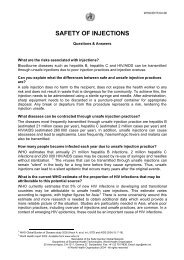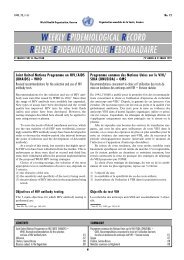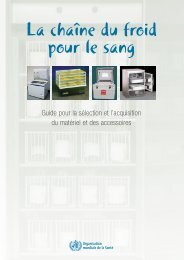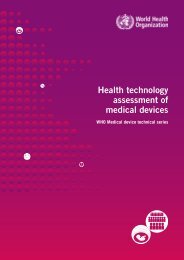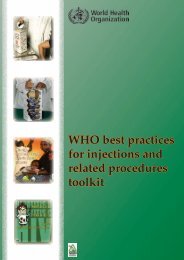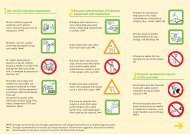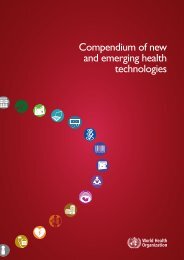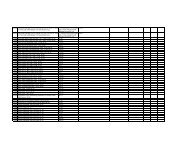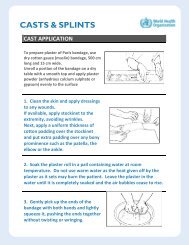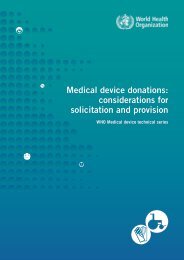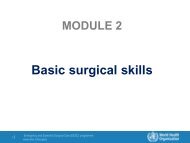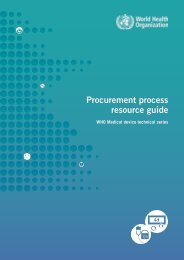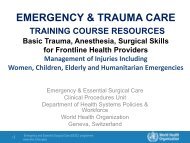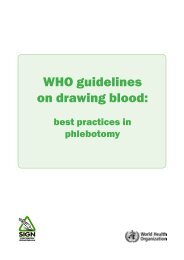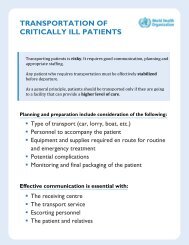SIGN meeting report 2003. - World Health Organization
SIGN meeting report 2003. - World Health Organization
SIGN meeting report 2003. - World Health Organization
Create successful ePaper yourself
Turn your PDF publications into a flip-book with our unique Google optimized e-Paper software.
2. Lack of knowledge of policies and guidelines and safe injection practices;<br />
3. <strong>Health</strong> care workers do not <strong>report</strong> needle-stick injuries;<br />
4. Careless behaviours in handling needles and contaminated materials that result in<br />
percutaneous injuries;<br />
5. Improper disposal and handling of sharps noted in all countries visited.<br />
Future plans for countries and WHO<br />
Future plans in countries include assistance with advocacy, assessments, joint planning<br />
with partners and mobilization of resources and personnel for national programmes for<br />
infection prevention and control and development of monitoring , evaluation and<br />
<strong>report</strong>ing systems. Future plans for WHO include continuation of the normative role in<br />
supporting operational research, adaptation of policy guidelines and training curricula,<br />
communication, experience sharing in the area of best practices, assistance to resource<br />
mobilization, development of surveillance and health care worker safety programmes,<br />
publishing and translating into French and Portuguese the WHO standard package and<br />
collaborating with partners for harmonization of the regional training materials in<br />
infection prevention and control so that practices can be standardized.<br />
AFRO technical support to countries in the area of injection safety<br />
Country support from AFRO to countries<br />
10<br />
Ousmane Dia,<br />
WHO AFRO, Harare<br />
AFRO is actively involved in assisting countries in the switch to auto-disable (AD)<br />
syringes that represent the safest option in immunization services. This switch creates<br />
new challenges in sharps waste collection and management. In the area of waste<br />
collection, two options are available. The current best practice remains immediate<br />
collection of used needles in sharps boxes. However, options in terms of needle removal<br />
are being explored. In the area of waste management, a particular focus is placed on<br />
facilitating a process of micro-planning at the district level.<br />
Future plans for 2004-2005<br />
Future plans for 2004-2005 in immunization will include (1) the promotion of the<br />
WHO/UNICEF bundling policy statement, (2) the support to integration of<br />
immunization into broader activities, (3) country support through review of action<br />
plans, (4) support to waste management and introduction of new technologies and (5)<br />
promotion of national environmental regulations on waste management.<br />
Country progress towards infection prevention and control and injection safety<br />
Progress towards safer injections in China<br />
Wen Yi,<br />
China CDC, Beijing, China<br />
In China, injection practices are heterogeneous, reflecting the differences in human and<br />
social development across the country. In view of the various settings, only few<br />
assessments have been conducted to document injection practices. The Chinese Field<br />
Epidemiology Training Programme (C-FETP) coordinated two injection safety<br />
assessment at county level that illustrated the differences among different areas .With<br />
more and more recognition of the situation at the national level, the Ministry of <strong>Health</strong><br />
is moving towards a national injections safety policy. In specific project areas, all<br />
immunization will now be administered with auto-disable syringes, with partial



